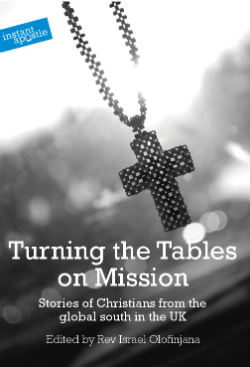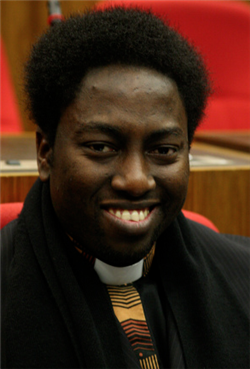The work of a Baptist minister is set to deepen understanding of missionaries from the Global South - or 'reverse missionaries' - in the United Kingdom.
In a first of its kind the Revd Israel Olofinjana has pulled together the stories of a number of significant leaders who have come to the UK from Africa, Asia, Latin America and the Caribbean, in turn highlighting the ‘transformative impact’ they have had on British Christianity.

Turning the Tables on Mission documents the experience of leaders such as Dr Ram Gidoomal (one of the founders of South Asian Concern), the Revd Joel Edwards (International Director of Micah Challenge and former Director of the Evangelical Alliance), Dr Jonathan Oloyede (convener of National Day of Prayer) and Bishop Donnett Thomas (Chair of Churches Together in South London).
Many started their own churches, often linked with established British congregations, ‘demonstrating the creative, fluid nature of their missional endeavours,’ said Mr Olofinjana.
The book also includes the experience of Mr Olofinjana himself, who came to the UK in 2004 as a missionary and joined a British Historic Church in order to understand the culture he had come to.
Mr Olofinjana said the book engages with the question whether ‘reverse mission’ is mostly rhetoric and shows that in fact these missionaries are actually reaching the indigenous people of the UK as well recent immigrant communities.
The book also aims to further the understanding of Christians across cultures, and help those newly arriving from the Global South in their cross-cultural mission.
‘The emergence and growth of these churches has led to new academic disciplines in British Universities, such as immigration studies, empire studies, diaspora studies, African studies, Caribbean studies, post-colonial discourses and world or global Christianity,’ said Mr Olofinjana.
‘This book is a resource for the British Church that can facilitate an understanding of Christians from other cultures. It will also be of interest to scholars of the discourse of religion in diaspora.’
The Revd Dr Steve Latham of Spurgeon’s College said the book helps to counter the notion that reverse missionaries are the solution to declining congregations. Nevertheless, it is not without hope.

‘This historic development in the British church scene possesses many admirable new initiatives,’ he said.
‘On the other hand, there is also much naivety, among both incomers who do not understand the British context, and indigenous leaders who unrealistically see this as the solution to dwindling congregations.
‘Israel Olofinjana’s careful evaluative comments enables us to avoid falling prey to over-optimistic illusions, but without giving up hope for God’s future move in revival in the United Kingdom.’
Dr Joel Cabrita, Department of Theology and Religious Studies, University of Cambridge, added, ‘The influential role of Christians from the global south is proving to be one of the most significant and transformative elements in the British religious landscape. We are increasingly observing a transformation within British Christianity, rather than merely a foreign addition to it.’